To Preserve a Demon
The Harlan Ellison Books Preservation Project - An Interview with Jason Davis
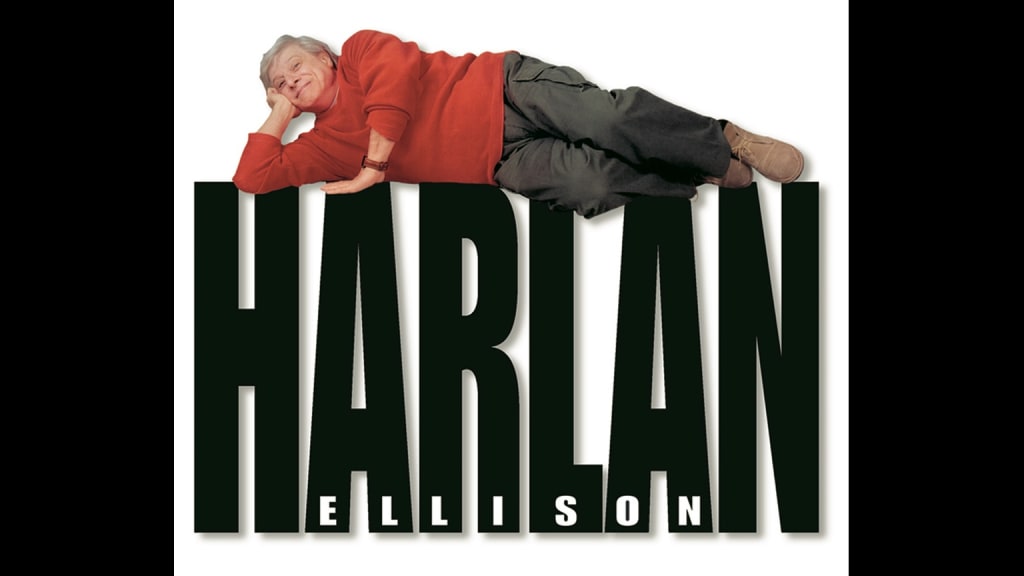
Writer/editor Jason Davis has a special ambition -- to catalog, digitize, edit, correct, annotate and re-publish (or publish for the first time, in some cases) all of Harlan Ellison's writings. Twenty-six four-foot-wide drawers of typescripts, over 100 feet of paper if stacked, the lifework of a man who is easily one of the most influential and cantankerous authors of the 20th century. Jason is spearheading the Harlan Ellison Books Preservation Project, a grand undertaking "To create definitive versions of all Harlan Ellison's writings, fiction and non-fiction, to preserve in print for posterity."
All within the thin time-frame of one year.
To date, he has reached $73,883 of his $100,000 Kickstarter goal. I had a chance to sit down with Jason at Barnes and Noble in Burbank to learn more about his project and the future of Harlan's writings. Davis, author of Writing The X-Files and editor of over 20 books of television history, is a polite fellow, sporting a jean jacket and graying beard. He is sharp, very precise and an expert in all things Ellisonian.
JS: Tell me about yourself. I know you write, and you've edited 17 books by Ellison thus far. Walk me through it, how did you meet Harlan? How did you get involved with being an editor of his work?
JD: I met Harlan in 2000, he was speaking at a convention in Texas. I had a traditional fan encounter with him. I met him again when I came to LA at the last signing at the Dangerous Visions Bookstore, which was in Sherman Oaks. The store had been named for Harlan's 1967 anthology, and the signing was for the 35th anniversary reissue of that book, but the store closed before the release so the last signing was in a photographer's studio next door. I talked to Harlan then, and over the course of the next several years I would encounter him at various events, to the point where Susan (Harlan’s wife) recognized me on sight and said “hello.”
Years later, I was doing editorial work for Babylon 5 Books, and the publisher, knowing Harlan was my favorite writer, asked me to edit a series of Ellison books produced by the same publication model. I went over, Harlan and I got along and we've been working together since 2010. (The first book, Brain Movies, Volume One, was released in the summer of 2011.)
JS: Why does Harlan trust you over other editors and publishers with this type of project?
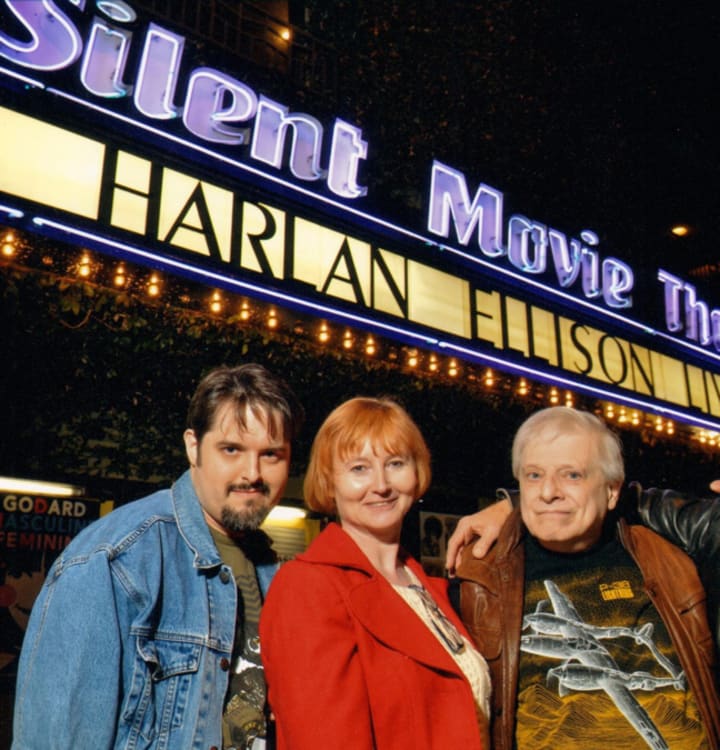
Illustration 4: Photo (C) 2012 by Rod Searcey. All rights reserved.
JD: I don’t know if he trusts me over anyone else, but what I can say is that I respect his work, and I made a point of that fact in our earliest meetings. I do not correct a typo without consulting Harlan, and I argue with him when I think he’s wrong, which is not often, but I think a lot of people haven’t done that the past. He respects that. He respects honesty and accuracy.
JS: How much unpublished work is there? And how much unpublished work is there that he actually wants people to see?
JD: There's not a lot of unpublished work, and there's not really anything Harlan doesn't want seen. He started writing at a time when you wrote to sell, to keep yourself alive, so there's nothing that was written not to be published; there was no time for that.
Unpublished, you’re mostly dealing with screenplays that were not produced, or material that was unfinished for one reason or another. A much larger category would be un-reprinted work, stuff that was published in the '50s and '60s, and was never reprinted in one of his collections. Those are the two arenas where HarlanEllisonBooks.com, the print-on-demand company I run for Harlan, has done most of its work.
We have a pair of books, Honorable Whoredom at a Penny a Word and Again, Honorable Whoredom at a Penny a Word. They collect much of what’s left of his uncollected short fiction. These are stories that might have ended up in The Deadly Streets, Children of the Streets, or No Doors, No Windows, crime fiction collections. For whatever reason, when those books were put together over the years, they included X, Y and Z stories but not A, B and C stories; as a result, some stories fell through the cracks. There are some excellent stories in those Honorable Whoredom collections, pieces like the three stories starring an insurance investigator named Jerry Killian, the jazz tragedy “Riff” and “Mac's Girl,” which is a punch to the gut.
There are also uncollected science fiction stories; those are coming out in Coffin Nails from Charnel House.
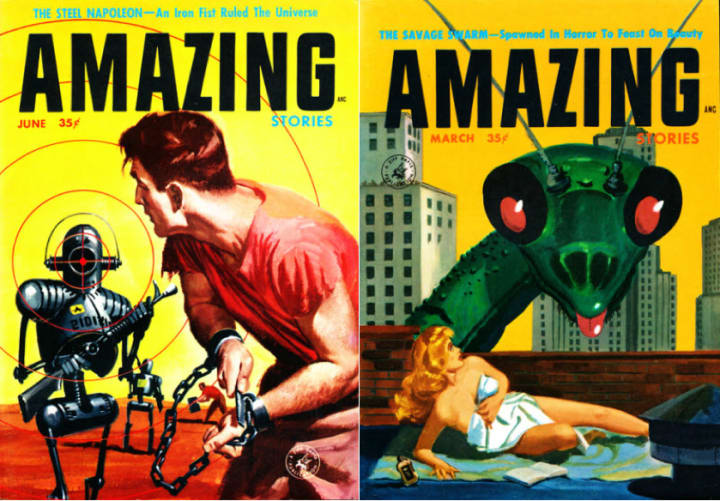
(Ellison's 1957 novelette "The Savage Swarm", cover-featured in Amazing Stories, as well as "The Steel Napoleon", which also took the cover of Amazing are in Coffin Nails.)
JS: Do you think that content wasn't reprinted because they weren’t the cream of the crop, even in Harlan’s eyes?
JD: No. Harlan started selling short stories in earnest in 1956. By early 1960, he'd sold roughly 166 stories, but only two short story collections – one crime and one sf – under his own name, containing 17 stories; that's 10% of his short story output collected in book form.
The next collections in each genre arrived in 1961 and 1962, by which time he's written more stories, so the newer ones are favored for those collections. Then Dorothy Parker publishes her famous review of Gentleman Junkie in '61, just as the pulp's are giving up the ghost, and Harlan quite rightly prefers to collect the stories that showcase him at the best of his abilities.
Over the succeeding decades, Harlan might resurrect and re-write stories from that earlier era. Several previously uncollected stories were added to various installments of Pyramid's uniform Ellison re-releases in the 1970s, and 1982's Stalking the Nightmare had stories from the '50s in it, but there was never a concentrated effort to preserve the earliest work in print until HarlanEllisonBooks.com.
JS: Is there anything in the files that Harlan told you, “I don’t want this to be reprinted. Don’t touch this, or those?”
JD: He insisted I put a disclaimer on a table of contents page of Again, Honorable Whoredom at a Penny a Word, for the story “Only Death Can Stop It,” which is a pretty egregious concept, but it’s a fun story.
JS: So, here we are, sitting a Barnes and Noble bookshop. Why aren’t there more Ellison books in here?
JD: At the moment, the vast majority of his catalog released prior to 2001 is available from a company called Open Road Integrated Media, which specializes in e-books. They are available through Amazon in print, but I've never seen them in bookstores.
JS: Why?
JD: I honestly don't know. He has had several recent republications like Web of the City, his 1958 gang novel, and it’s out from Hard Case Crime with a gorgeous cover by the late Glen Orbik; that's available in stores.
JS: But when you read something like Shatterday, it blows a lot of the stuff away currently on the sf shelves. I say this respectfully, because I would love to see more of his writing in mainstream bookstores.
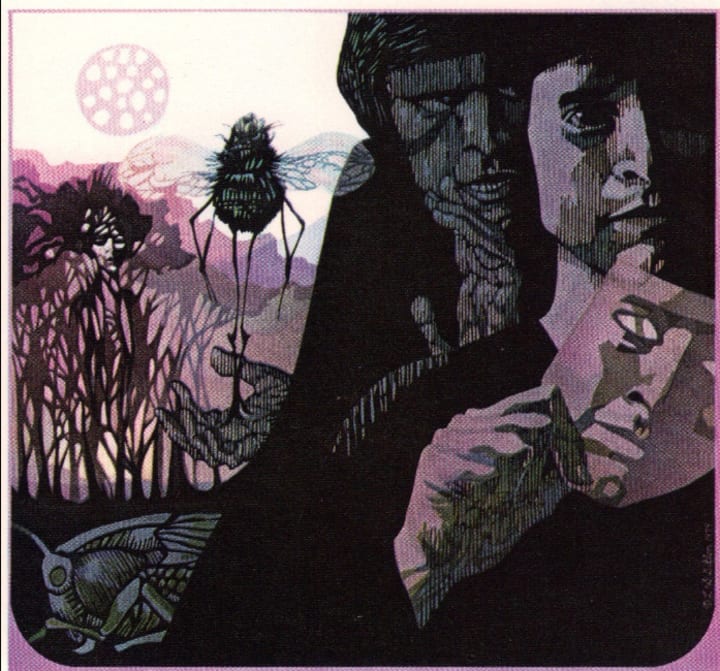
Cover art by Leo and Diane Dillon
JD: We live in a Bestseller society where bookstores will stock writers who move a large volume -- John Grisham, up until recently, Tom Clancy, people of that ilk -- and there's a craving for what's known, not just with the booksellers, but with the readership, which wants more of what they've just read, reliable series that deliver the same experiences with slight variations on a theme; the literary answer to television's police procedural.
JS: They want pre-sold talent.
JD: Exactly.
JS: Even much of the news is made up of Top Ten Lists. Garbage culture. Everything that Harlan fought against.
JD: Exactly. And if you go to the science fiction shelves here -- please note: I don’t refer to Harlan as a science fiction writer; he is an adjective-less writer -- but if you were to go into the sf section over there, would you find Robert Silverberg? Would you find Alfred Bester? You'll find Heinlein, Herbert, Philip K. Dick. Those are the guys whose catalogs for whatever reason continue to be perennial.
JS: But don't you think that Harlan's catalog is perennial?
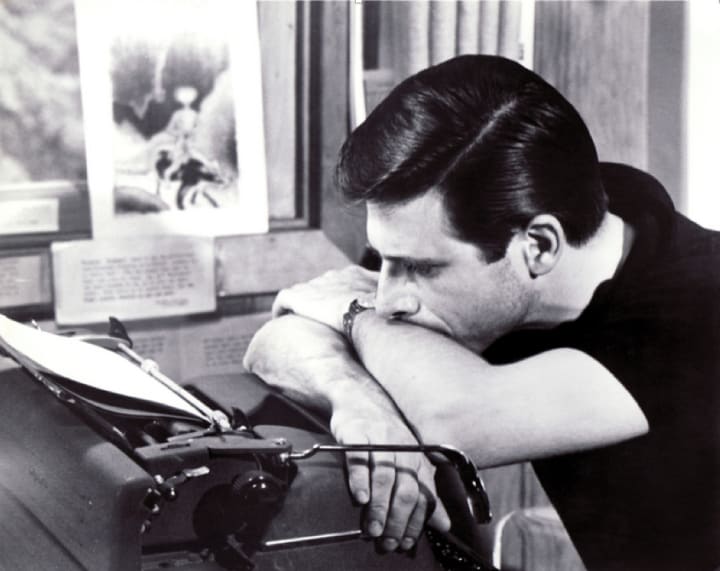
Illustration 4: Photo by William Rotsler.
JD: I'm dedicating a year of my life to preserving it, so yes.
JS: How did this project come about?
JD: I took over HarlanEllisonBooks.com in 2012. For the most part, I've been limited to publishing the previously uncollected, and un-reprinted stuff. His other works were with other publishers. I could do a new collection, like Harlan 101, which contains stories that you'll find spread across many other Ellison collections. I can do that as a unique volume, and it did very well.
Certain economic factors were built into the original business model before I took over, and -- as previously noted -- the rights to most of the iconic collections are tied up elsewhere, so because of the need to sell X copies of a given book to make a return, I've concentrated on material that wasn't available in any form elsewhere, with a few exceptions -- like Harlan 101 or 8 in 80 by Ellison -- where there was some unique aspect to the book that made it worth releasing.
For the Preservation Project, I'm working at the story/essay level, so I'm not stepping on anyone else's toes. The entirety of Harlan's work will be digitized and corrected to make sure it's as the author intends it. In the future, if a publisher comes to him and says, "I want to put out a new edition of Shatterday in hardback," it will be a simple matter of pushing a button, and a complete text of that collection goes off to the publisher in electronic form after the contract is signed. As it currently stands, that publisher would receive a large box of photocopied typescripts which would have to be scanned or typed into a computer for publication, which leads to inputting errors and a lot of back-and-forth between the publisher's employees and Harlan's office via phone, fax and e-mail. One of the goals of this project is to make republishing Harlan's writings more appealing to publishers -- who have their own economic pressures to deal with -- by front-loading a lot of the editorial work.
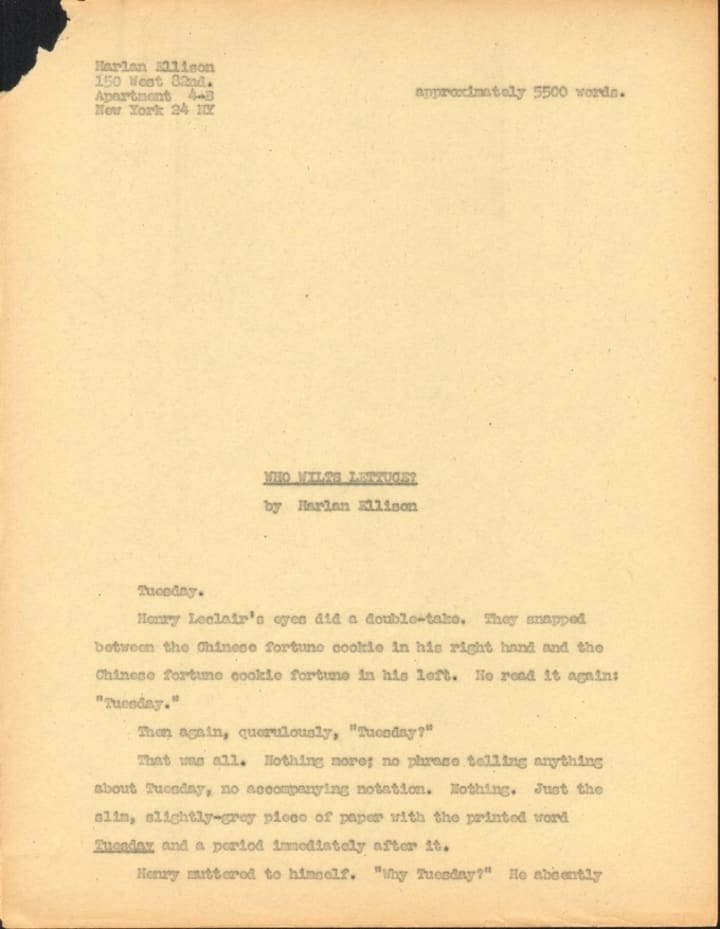
JS: Are you going to catalog Harlan's letters as well?
JD: That has been discussed.
JS: Is this project something you actually pitched to Susan and Harlan?
JD: Yes, I pitched it to them over half an hour in September.
JS: Were they immediately on board?
JD: They saw the big picture immediately. They were a little hazy about a Kickstarter aspect of it, because they weren't familiar with that platform and how it worked, though SkyBoat Media had used it to finish the production on their audiobook of The City on the Edge of Forever earlier this year. I laid it all out and explained how it worked. They saw the opportunity. They saw someone who had proven himself.
This is not something that I would do had I not done the 17 previous Ellison books. I would not be asking people for money to work on Harlan's entire oeuvre. I would not put myself up for it had I not delivered in the past. There have been cases where people said they were going to put out this book or another book and nothing ever came of it.
JS: You mean like The Last Dangerous Visions?
JD: That's a different story.
JS: You don't have any insider information on that do you? Is that ever going to be released?
JD: I would do anything I could to make that happen.
JS: Is there a plan for posthumous releases that you can't touch? Is Harlan sitting on stories that he doesn't want released until after he's gone?
JD: There's nothing like that. There's no Go Set a Watchman lying in the files for eventual release by someone who wants to cash in.
JS: Is he still writing?
JD: Yes, at a greatly reduced amount. “He Who Grew Up Reading Sherlock Holmes” was published in 2014, and collected in Can & Can'tankerous last year. “Don't Look Behind You: The Last Dangerous Introduction to Ellison Wonderland” is a 120-plus page essay/memoir that opened the recent reissue of Ellison Wonderland from PS Publishing. There are a few pieces -- including another long essay, which I love -- that have not yet been published.
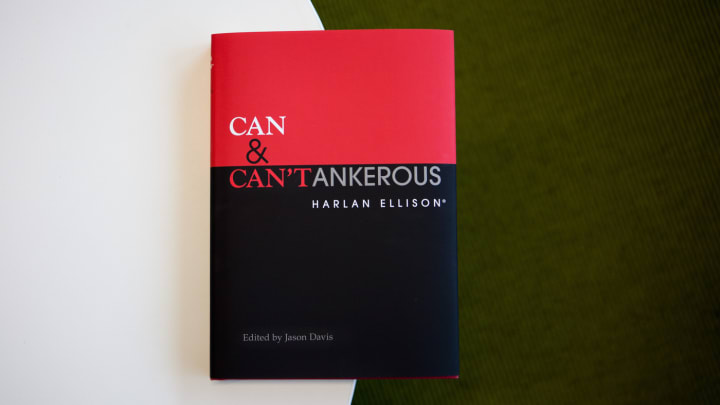
JS: Are you collecting all the introductions in this project?
JD: Yes. One of the things that I'm very much looking forward to is creating appendices for the reissues of books like Ellison in Wonderland and I Have No Mouth & I Must Scream, any of his short story collections. There have been many times over the years when a story appeared by itself in an anthology. Take for example the story “Basilisk,” which appeared in a special issue of RBCC in 1980. It was accompanied on this occasion by a brief introduction derived from an Ellison-written letter that appeared in a 1978 issue of Galaxy. Now, unless you have those issues of Galaxy or RBCC, you don't have that introduction, which is Harlan's commentary on his own story.
One of my goals is to collect every story, and any introduction or commentary that he's written anywhere for that story -- wherever it was -- and put it in the appendix of the book containing that story. You'll have Harlan commenting on the stories in the book.
JS: Are you getting paid for this?
JD: The payment is a portion of the Kickstarter proceeds, which also cover taxes, equipment, the manufacturing and shipping of the actual books going out to people who supported the project. I'm doing it for the love of it, not for the money. If I had been doing it for money, I'd be gone after the fourth book.
JS: Why haven't we seen more Ellison work on the screen? Has their estate been approached by production companies?
JD: Things are constantly under option. It's just a matter of Hollywood, especially in the realm of movies, where things get so far and they get no further.
JS: Asimov described Ellison as perhaps the most colorful personality in science fiction. The thing about Harlan, from what I've read and studied and the people I've talked to is that he can be very polarizing.
JD: Yes, and he knows it. He's perfectly aware of it. Anybody who lives their life the way they want to live it is going to be.
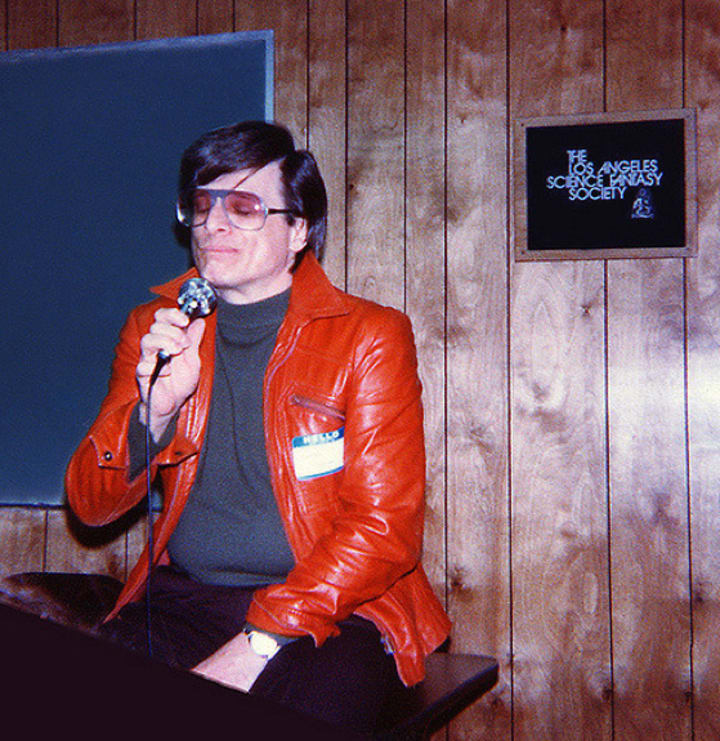
Ellison at LASFS
JS: He really lived it the way he wanted to live it.
JD: Yes, very much so.
JS: What else would you like to share with fans and supporters about this project?
JD: The thing of it is -- the part that's the hardest to explain on the Kickstarter page -- that it's akin to a PBS pledge drive. You're not pledging for the books that you get for contributing; you're pledging to preserve the entirety of Harlan's work, and to facilitate an archive that will be available to either potential publishers for reissues or limited-edition releases or for the Ellisons to sell directly to the reader via HarlanEllisonBooks.com.
JS: Is there any content we've never seen before?
JD: Oh, yeah. There's plenty of stuff that's not been seen.
JS: What's the principal unseen stuff?
JD: For unseen material, it's mainly scripts. There are seven volumes of Brain Movies collecting that work thus far, and there's more to come.
A lot more of what's in store are non-fiction pieces that were published in men's magazines in the 1960s, and which have never been reprinted. There's a very odd little book called A Fish-Head in Aspic that I adore; I don't know how to describe it, but one of the pieces is titled “I Raped Freedom in Budapest” by Jaroslav Milanyov, as told to Harlan Ellison.
JS: So you're doing articles also?
JD: Oh yes, fiction and non-fiction. In total, there is about 44 books worth of material.
JS: What about all the TV and radio interviews? Are those going to be archived somehow? Would you be involved with that?
JD: I would love to. I don't know if it's possible. In the case of TV interviews, obviously they are copyrighted by the entity that put them out. Harlan was on Tom Snyder all the time, he was on Politically Incorrect frequently.
There's also Deep Shag Records; they produce On the Road with Ellison, and are up to volume six. Michael [Reed] at Deep Shag, has been doing albums of Harlan's public appearances. They're great. It's like going to a convention, or a college lecture and seeing Harlan on stage. The recordings go all the way back to the '70s. Michael goes through all the material and edits it, carefully pulling from here and there and creates immensely entertaining CDs. There will be more of those. He's working on the next volume.
The thing that I would like to see released is Harlan's radio show.
JS: Hour 25! Where is that!?
JD: Mike Hodel ran a science fiction radio talk show for many years. On his death bed, Hodel asked Harlan to take over the show, which ran for many years in Los Angeles on KPFK. Harlan took over in 1986, renamed it Mike Hodel's Hour 25 and ran it for a year, or year and a half as host. He wrote a short story, “The Hour that Stretches” in Stalking the Nightmare, about Hour 25. Those shows exist. He has audio cassettes of them.
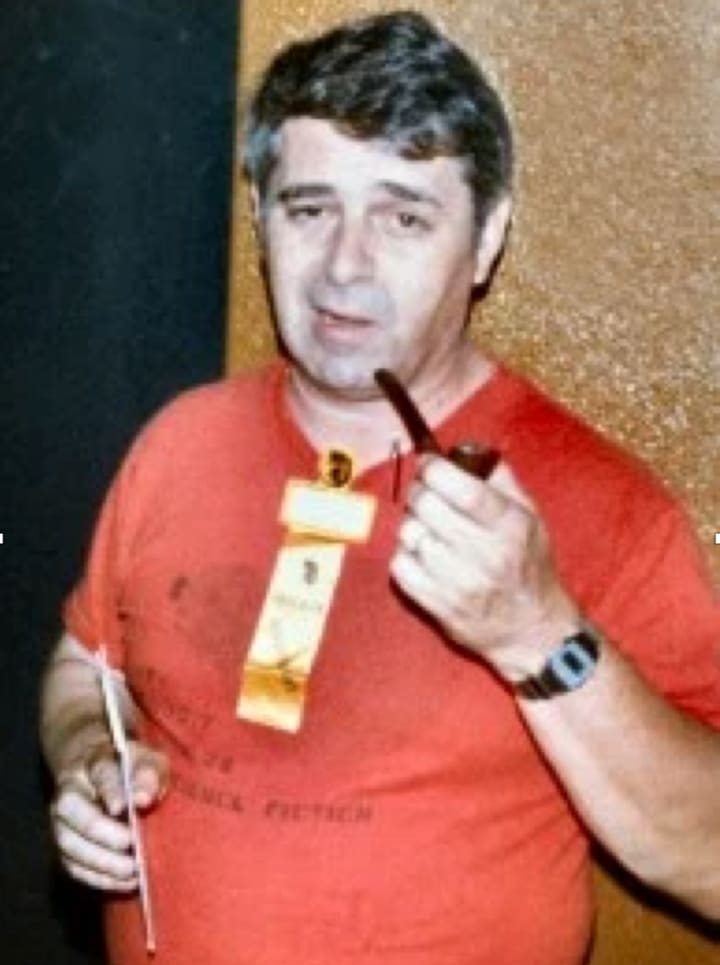
Mike Hodel
JS: They're not on Youtube. They're not online.
JD: No, they're not. They feature interviews with people Frank Miller, James Ellroy, Robert Silverberg, Dan Simmons, Clive Barker, Julius Schwartz and David Brin. There's a memorial episode for Charles Beaumont that features Richard Matheson. One of my favorite episodes from 1987 had Dorothy Fontana and David Gerrold discussing Star Trek the Next Generation (TNG) long before it premiered, and they talked about a very different version of the show, but they both walked off the show due to Gene Roddenberry's lawyer. It's a snapshot of what was happening on that show before William Shatner's recent Chaos on the Bridge documentary takes up the story.
JS: How do we listen to those?
JD: Well, that's one of the things I would love to put out because Harlan does own those episodes. It would be a matter of finding a distribution venue, something like iTunes or Band Camp. It's something I've considered and we've talked about. Some of them would have to be edited, because occasionally, he'd read short stories that would need to be cleared with the authors.
JS: Are you interested in archiving other writer's estates?
JD: No. Harlan's special for me. If somebody said, “Let's do an Alfred Bester archive,” that'd be great, and I'd help out. But no, it's Harlan. He collided with me at just the right time to knock me out of my cozy suburban, middle-class orbit and set me off on a better course than I was on before.
JS: He has that effect. Even though I met him for a brief moment, he did change my life. Do you think Harlan still has enemies?
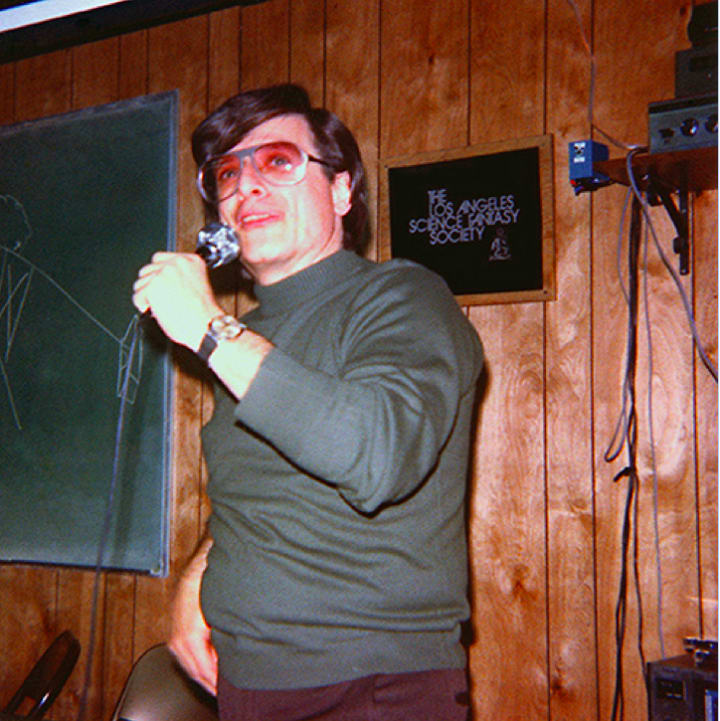
JD: There are always enemies. There are people who are wrong and there are probably people who have legitimate reasons. I have enemies, and I'm no Ellison.
JS: I ask -- and maybe this is just in my head -- but there was a Tom Snyder interview where Harlan jubilantly discussed successfully suing arrogant Hollywood execs. He encouraged writers to sue and to fight back against the system should it wrong them. And the video was quickly pulled. Harlan always demanded that writers not write for free, and that they stand up for their work and rights. There are a lot of people in this town that wouldn't want that kind of thinking to come into vogue. It was taken off of Youtube very quickly, while the other Snyder interviews remained.
JD: It was probably the Brillo lawsuit, which Harlan discusses in Brain Movies, Volume Four. Anyone could've taken it down, because, technically, whoever put it up on Youtube ain't Tom Snyder or his production company.
JS: Is there anything you want to share, besides what we discussed?
JD: His house is amazing. He has secret rooms. He always said that the mark of being a success is that you have what you wanted as a kid, and in his case, that's lots of comic books and secret rooms and he has that.
JS: Does he encourage you to pursue your own writing?
JD: Yes. We always go over my editor's notes together, and he rarely has any notes. He's also read a few pieces of my fiction and offered encouragement.
JS: What was his advice about getting paid to write? He had to hoof it for a long time.
JD: You have to remember when he was writing, it was during the last gasp of the pulps. So you could write ten stories in a week, and sell them to seven magazines.You made a comment in one of your essays that I read (“Universe Collecting”) about how the magazine pay-rate has stayed the same since the '30s. I thought to myself, yeah, that's unfortunately accurate. But here's the thing, if you send it out and someone offers to pay for it, great. If they don't, you put it in the drawer, you write the next one and you send it out until somebody offers to pay for it.
JS: Right, nobody is stopping you from writing quality material on your own. What you're trying to do is create an amazing experience.
JD: Part of what I'm hoping to do -- part of this experiment and it's an experiment you can only do with somebody who is a known quantity like Harlan, but not a relative unknown like me -- is give the artist back control of the work. There is no reason -- in a world where the publishers are only interested in the Bestseller List, and churning out of as many copies as they can of various series, the same thing over and over again -- why someone like Harlan who has a back catalog of 100-plus books, can't take the tools that have evolved over the last yen years -- print-on-demand publishing, layout and design software, e-mail and online marketing applications and e-commerce sites -- and put out their own books, have complete control over them, and not have a middle-man taking the cut of the profits.
Conventional publishers are great at spotting and nurturing and pushing out to the public, new talent, but if you're somebody who exists as a big enough name and who has a desirable catalog, why not do it yourself (with technical and editorial assistance from me, if necessary)?
I despair of that terrible window of copyright wherein, if the heirs have no interest in doing anything with a literary estate, it fades into obscurity. If no one remembers an author's work by the time the copyright lapses 70 years later and it's in the public domain, they've been swallowed up by obscurity.
Harlan's favorite writer, Gerald Kersh, as far as I know, left no heirs when he died in 1968. Just recently, in the last few years, a bunch of publishers have reissued his books, because people like Harlan Ellison have been talking about him for years, and he died before copyright extensions could withhold his work until even his admirers were gone and could no longer commend him to future readers.
JS: It must be frustrating for him as a writer, in that he is SO GOOD. And to see so many others getting spots that he could've killed. Seeing so many lesser writers and screenwriters getting shots he should've. In the field of screenwriting especially, the best writer doesn't always get the gig. It just doesn't work that way. It must be vexing because he IS that good.
JD: Harlan does the work he wants to do.
Harlan has said, “Writers take tours in other people's lives.” If this Kickstarter succeeds, it will be a helluva thing because I'll be taking a tour of Harlan's life by submerging myself in his work for 365 days. As I set up shop in his office, he'll set up shop in my brain. This Kickstarter will ensure that his work remains available so a kid who's not yet born as we speak will one day re-create a little bit of Harlan in his or her mind.
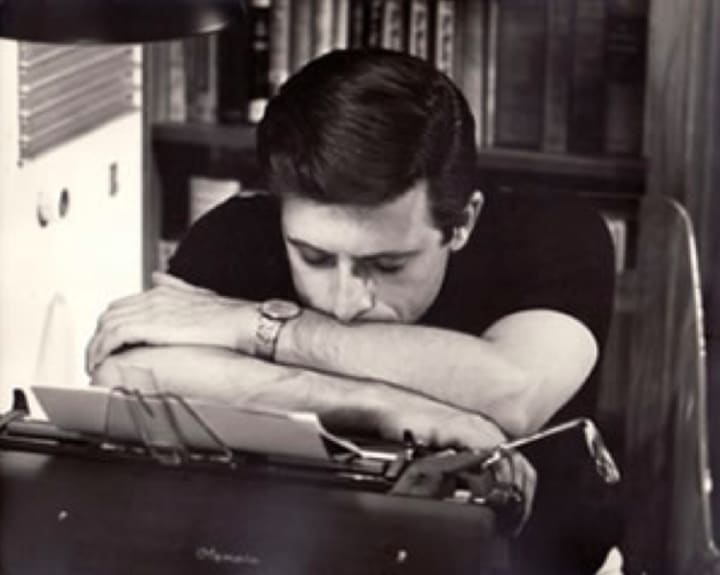
Illustration 4: Photo by William Rotsler.
To support the Harlan Ellison Preservation Project, go to: https://www.kickstarter.com/projects/1387618382/the-harlan-ellison-books-preservation-project
And be sure to check out and purchase new publications from: http://www.harlanellisonbooks.com/
About the Creator
Joshua Sky
Originally from Maui, Hawaii, Joshua is a multi-award winning writer based in LA. He has written for Marvel, SciFutures, Motherboard, Geeks and is represented by Abrams Artist Agency.






Comments
There are no comments for this story
Be the first to respond and start the conversation.